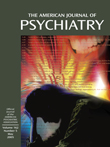Childhood Trauma and Personality Disorder: Positive Correlation With Adult CSF Corticotropin-Releasing Factor Concentrations
Abstract
OBJECTIVE: To test the hypothesis that early life trauma results in adult stress hormone alterations in individuals with personality disorders, the authors examined the relationship between history of childhood adversity and lumbar CSF corticotropin-releasing factor (CRF). METHOD: Participants were 20 otherwise healthy men who met DSM-IV criteria for personality disorders. CSF CRF was obtained by lumbar puncture, and childhood adversity was measured by the Childhood Trauma Questionnaire. Correlations were obtained between CSF CRF and the total score on the Childhood Trauma Questionnaire as well as scores on its four subscales. RESULTS: CSF CRF concentrations were positively correlated with the total score on the Childhood Trauma Questionnaire. Analysis of the subscales revealed that CSF CRF was correlated with emotional neglect. Correlations between CSF CRF level and physical and emotional abuse and with physical neglect were not statistically significant. CONCLUSIONS: Consistent with the hypothesis that the severity of early life stress is correlated with stress hormone abnormalities in adulthood, Childhood Trauma Questionnaire total scores and emotional neglect scores were significantly correlated with CSF CRF levels in individuals with personality disorders.



